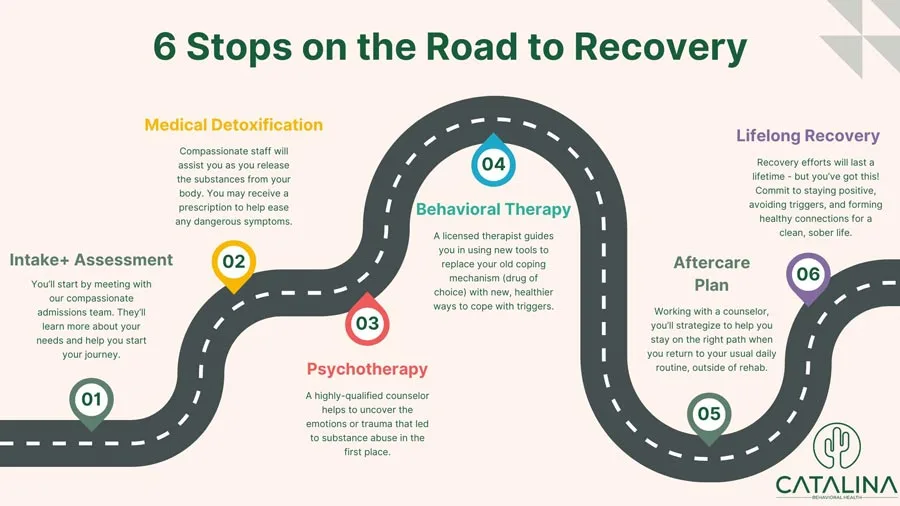The Rising Risk of Mixing Substances Among Young Adults
Have you ever heard the term and wondered, what is cross faded? Cross-fading is the practice of mixing two substances. Most often, it means drinking alcohol and smoking marijuana simultaneously. It’s a common practice for young adults who seek the overlapping drug effects.
However, abusing multiple substances can pose significant risks of greening out, passing out, dehydration, and other adverse impacts.
Catalina Behavioral Health recognizes the dangers that can come from using both alcohol and marijuana. Crossfading can quickly escalate from a casual “partying” habit to a full substance use disorder. We’ve helped countless clients recover from abusing alcohol and other commonly used drugs.
Keep reading for in-depth answers to your question: What is cross-faded? And stick around to get treatment options if this is becoming a regular practice for you or someone you love.
Get Effective Detox and Rehab Options
How Cross-Fading Affects the Brain and Body
When you’ve gotten cross-faded, you’ve set off a chain of events in the body, increasing the effects of both substances. When you drink alcohol, it increases the absorption of the THC in marijuana. The simultaneous alcohol and cannabis use means you’re raising THC levels in the brain blood faster than if you had used either substance alone.
The increased THC absorbed triggers the brain’s cannabinoid receptors, making the psychoactive effects of marijuana more powerful. That can lead to panic or paranoia, for example.
Binge drinking, which the Centers for Disease Control and Prevention (CDC) defines as four (males) to five (females) drinks on a single occasion, mixed with marijuana, decreases cognitive function.
The impairment of the central nervous system can endanger you due to poor or cloudy judgment. The sedative effect of mixing alcoholic drinks and cannabis can be also overly sedating for some, and lead to exhaustion or passing out.
A Few of the Potential Risks of Cross Fading

Although those who cross fade usually mix depressants like marijuana and alcohol, there are countless other drugs, as well. Some cross-fade with prescription medications, or other substances as well; such as amphetamines or benzodiazepines, among almost an infinite array of combinations that exist.
Others might prefer a speedball – mixing heroin and cocaine. The potent stimulant mixture is a very dangerous method of cross-fading.
Regardless of the drug of choice, this form of substance abuse is incredibly dangerous. Here are some adverse health consequences:
Combining Alcohol and Drug Abuse Means Increased Impairment
Drinking alcohol and driving are among the riskiest of all behaviors after one has cross-faded. But when one starts to mix alcohol and weed, the risk becomes even more significant. Both alcohol and too much THC can lead to decreased motor skills. Using multiple substances together can intensify the effects.
Too Much Alcohol and Weed May Lead to Greening Out
When someone drinks alcohol and uses marijuana to excess, it can trigger “greening out.” Meaning: intense nausea and vomiting and a loss of sense of time and place.
Both the alcohol intoxication and the THC in the weed amplify one another’s effects during cross-fading. That can overwhelm the body. Other associated symptoms of a green-out are dizziness, sweating, and dehydration.
As with alcohol, a marijuana hangover can also occur, and having consumed both in combination can worsen this effect.
Mixing Alcohol and Marijuana Can Cause Blacking Out, Putting You in Greater Danger
One of the scariest negative consequences when someone has cross-faded is blacking out. You may still be active, but you lose the memory of all events when blacked out. This potentially hazardous situation means you may engage in such risky behaviors as unprotected sex.
Even worse, a blackout can leave you vulnerable to someone exploiting you; sexual assaults are common as are drunk driving incidents. Both can lead to long-term psychological consequences, from trauma to severe anxiety or depression.
A Cross-Faded High and Decreased Cognitive Function and Motor Skills
Cross fading also usually diminishes cognitive functions more than using either alone. Using two substances impacts short-term memory, reduces attention span, and impairs decision-making.
Tasks that require concentration and coordination, such as driving a car, become extremely challenging and riskier. The impairment can also affect social skills or lead to poor judgment in critical situations.
For example, frequent users sometimes think they’re “okay to drive,” but they’re not. Driving while cross-faded on alcohol and marijuana can cause major legal issues.
Marijuana and Alcohol Abuse Strains the Cardiovascular System

Cross-fading using marijuana and alcohol together creates additional stress on the cardiovascular system. Both substances can cause changes in blood pressure and heart rate separately, an outcome even more marked if you combine the two.
This can lead to heart palpitations and irregular heart rhythms. Thus, it raises the risk of a cardiac event, especially in those with preexisting heart conditions. In more frequent users, the chronic abuse of both substances can lead to heart disease.
Cross-Fading: Alcohol, Drugs Both Alter Our Perceptions of Reality
The combined effects of cross-fading distort sensory inputs and cognitive processing. That can lead to altered perceptions of reality when individuals engage in cross-fading. It can significantly alter one’s perception of time, space, and self.
That may create a surreal and sometimes disorienting experience. Visual and auditory hallucinations can become more pronounced after someone has cross-faded. Plus, the boundaries between self and environment may blur, creating a sense of detachment from reality. These altered states can also bring about anxiety and impaired safety.
Mental Health Issues When Someone Has Been Getting Cross-Faded for an Extended Time
Combining alcohol and marijuana puts one at a larger risk of developing mental health issues. The use of these substances together can lead to marijuana addiction or alcohol use disorder.
When someone has cross-faded for a while, they have specific risk factors for more severe mental health challenges. These might mean experiencing paranoia and extreme panic attacks. While physical overdose from weed is nearly impossible, using amounts of THC that lead to psychological crises and an emergency room visit is not at all uncommon.
The heightened levels of THC absorbed while drinking amplifies the effect, causing intense episodes of panic that are both distressing and debilitating. This combination of factors can create a cycle of mental health deterioration, complicating recovery and treatment efforts.
Reach Substance Abuse Rehab Hotline
What Are the Signs of Someone Developing Substance Abuse?
When you recognize the signs of someone struggling with an alcohol or drug addiction, you will be in a better position to help them. Whether they have cross-faded or taken a moderately risky single drug, you cannot help until you know what to look for. Our addiction specialists suggest you watch for these ten signs:
- Increased tolerance: After extended use, it takes more of an individual’s drug or choice of favorite alcoholic beverage to have the same effects.
- Withdrawal symptom: The person has mild to severe symptoms when not using the substance.
- Neglecting obligations: Some prioritize using substances over family, work, or educational commitments.
- Lack of interest: Losing interest in once-pleasurable activities can occur as the focus shifts to using.
- Increased health risks: Despite adverse effects on the body, such as impaired cognitive function or respiratory depression, the person continues using the drug of choice.
- Cannot quit alone: Sometimes, the person starts developing negative feelings about drug or alcohol use but physically cannot quit. They may lash out or become moody.
- Taking unnecessary risks: The person lacks judgment and engages in risky behaviors, such as meeting up with street dealers.
- Relationship problems: Addiction can cause strained relationships and loss of trust with friends and family.
- Craving drugs or alcohol: They have a strong, irresistible urge to use drugs, whether they drink alcohol, smoke marijuana, or abuse another drug.
- Spending much time on substance abuse: Finding, using, and getting high becomes a primary use of their time.
These are only ten addictive behaviors to consider. Although they are typically alcohol and marijuana use indicators, they can also be applied to most other illicit drugs.
Getting Professional Help for Substance Use Disorders

When someone smokes marijuana or drinks alcohol, they may not realize the inherent risks of getting cross faded. Many alcohol or marijuana users have told us that because alcohol is legal in every state and marijuana has been legalized in many states, they thought they were safe when they got cross faded.
Despite their legality, chronic substance use can become a problem, especially when mixing substances. If you or a loved one has been getting cross-faded for a long period and wants to quit, help is available, and there are many benefits to putting down cannabis and alcohol.
Catalina Behavioral Health provides personalized treatment plans for every client. Here’s how your journey to recovery after you’ve cross-faded might look:
Intake and Assessment (The First Step to Stop Cross-Fading)
The road to recovery at Catalina starts with our admission team for every inpatient or outpatient client. For most, the journey starts before they even arrive! Our admissions team will verify and coordinate every client’s insurance benefits or explain our self-pay options before they come to the facility.
Upon arrival, you will have a brief assessment of your physical and emotional well-being. This discussion helps ensure you receive the proper support as you embark on this transformative journey.
Medical Detoxification Is the Next Step
While many fear detox for substance use, the truth is that it can be mild for some clients and more severe for others. While we can’t predict your experience, we can commit to putting you in the care of a supportive staff member who will monitor your wellness. If we see emotional or physical health risks develop, our clinicians may prescribe medication to help.
Psychological Counseling (The “Why” of Alcohol or Drug Addiction)
Catalina Behavioral Health provides experienced, licensed counselors who can help you identify “why” someone started to cross-fade or use drugs. For many, that can mean a mental illness or trauma in the background. Once we identify this, we can better heal the addiction.
Behavioral Health Therapy (How to Make Long-term Changes)
Behavioral health changes work alongside psychotherapy, with it being the “how” to change after a client discovers “why” they became addicted to cross-fading. We use evidence-based techniques that help re-mold behaviors, replacing poor coping mechanisms with positive ones.
Aftercare Planning to Stay Clean and Sober (Prevent Relapse)

Aftercare planning is a key part of recovery. In individual counseling or group therapy, you’ll equip yourself with a set of tools that you can use whenever triggers get in the way of your progress. In the metaphor of a journey, it’s like having the ability to fix a leaky tire. You pull out the gear, fix it, and continue pressing forward.
Your Life in Recovery is a Long-term Commitment
Recovery doesn’t end when you leave Catalina Behavioral Health. It takes dedication and commitment for a lifetime. You may occasionally feel those familiar pangs or cravings, but now you have the skills to manage those desires.
Up To 100% of Rehab Costs Covered By Insurance
Getting Cross Faded Too Often? Connect with Catalina for Help
If you have cross-faded and want to stop, the Catalina Behavioral Health team can help you get your life back on track. We have seen it all – from too much weed leading to extreme paranoia to alcohol poisoning and even overdose survivors who had blood alcohol levels above a .04.
We’ve helped numerous people get their lives back after mixing alcohol and marijuana became a damaging part of daily living.
Give us a call today; we are always glad to help new clients on their journeys to a clean, sober life!





